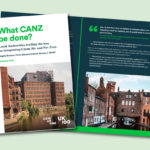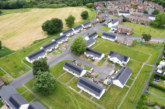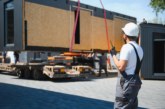A new report argues that Birmingham, Camden, Hertfordshire, Leeds and Nottingham are leading the way in integrating climate and clean air policies but Ministers’ “refusal to recognise the importance of joined-up policy making” is stalling wider progress.
The report, “What CANZ be done?“, was released on the 30th January 2023 by UK100, the UK’s only cross-party network of local leaders committed to ambitious Net Zero and clean air action.
It follows the release of the organisation’s “Yes We CANZ!” report in June 2022, which introduced the concept of “Clean Air Net Zero” (CANZ) — ensuring Net Zero policies include a clean air audit and vice versa.
It also comes in the wake of a new study published in The Lancet that finds clean air and Net Zero action will give people in England and Wales an extra two million years of life.
It argued not enough has yet been done to learn from the mistakes that led to dieselgate, where diesel vehicles were promoted across Europe as a climate-friendly option without regard to the increase in deadly air pollution emissions associated with diesel combustion.
CANZ was raised in Parliament earlier this month [16 January 2023] when Defra Minister Rebecca Pow MP with a flat refusal to a Written Question from Shadow Minister Stephen Morgan MP asking whether Defra would consider the recommendations in UK100’s “Yes We CANZ!” report.
“What CANZ be done?”, which features case studies on the joined-up CANZ action being taken by cross-party local leaders in Birmingham City Council, the London Borough of Camden, Hertfordshire County Council, Leeds City Council and Nottingham City Council, will be sent directly to Defra with a plea from UK100 for Ministers to reconsider their reluctance to engage the issue.
The letter to Ministers also requests a meeting with the Secretary of State to discuss how UK100 can support the Government to empower local leaders across the country to follow Birmingham, Camden, Hertfordshire, Leeds and Nottingham’s lead on CANZ.
From a Clean Air Zone in Birmingham to region-wide collaboration in Hertfordshire, the report uses case studies to highlight the local authorities already taking action to exploit the four key “win-wins” of CANZ:
- Support a transport shift away from private car reliance
- Make homes warmer through insulation and energy efficiency measures while switching to fossil-fuel-free heating systems
- Work with the agricultural industry to support less intensive farming and reduce the level of ammonia emissions
- Empower local communities to make informed choices with more data transparency and access
At the same time, however, the report restates the policy areas where a careful balance between the clean air and Net Zero agendas is necessary, including:
- Learning the lessons of dieselgate and carefully considering which vehicles are most beneficial overall as the UK transitions away from petrol and diesel-only vehicles
- Balancing the carbon emission reductions linked to “low carbon” heating fuels, like biomass and hydrogen, with the negative impacts on local air quality
- Understanding the unintended consequences of poorly designed tree planting and green infrastructure policies.
- Considering the trade-off associated with air-tight energy efficiency schemes and the ventilation needs to improve indoor air quality
To accelerate CANZ progress, local leaders in the report are calling on the Government to:
- Introduce a clear mandate for local action, such as a statutory duty to act and report progress on both Clean Air and Net Zero — the move could accelerate action if it is accompanied by appropriate resources for local planning and delivery.
- Strengthen and integrate current UK Government policy and regulation on air pollution and Net Zero — as recommended by the National Audit Office’s recent report on tackling local air quality breaches.
- Provide sustained long-term devolved funding, that brings an end to short-term, competitive pots of funding — as recommended in the recent Mission Zero independent Net Zero Review.
Welcoming the report Jason Torrance, Interim Chief Executive of UK100, said: “Aligning Clean air and Net Zero (CANZ) isn’t pie in the sky — local authority leaders from Birmingham to Wiltshire are already taking ambitious and joined-up action to great effect.
“But wider progress is being hampered by the government’s lack of a coherent national strategy, disjointed short-term funding and a refusal to recognise the importance of CANZ. Local leaders are ready to support the government to maximise the win-wins of an approach to vital clean air and Net Zero action that offers more than the sum of its parts.”
“We call on the Defra Secretary of State, Thérèse Coffey, or Minister, Rebecca Pow, to reconsider their refusal to consider the recommendations of UK100 members and sit down to meet with the local leaders that can set a nationwide example to follow.”
Matthew Clark, Programme Manager of Air Quality at Hertfordshire Council Council, added: “Linking activity on Clean Air and Net Zero can help drive your officers together, your politicians together, and your communities together over action which is bigger than the sum of its parts.”
Discussing the decision to introduce a single cabinet role with dual responsibility for clean air and Net Zero, Polly Cook, Chief Officer, Sustainable Energy and Air Quality at Leeds City Council, continued: “The benefit we’ve got from our structure is having a wide team who have a really deep understanding of the two issues —so when people are working on specific projects they can understand the implications for both.”
Alongside case studies from Birmingham City Council, the London Borough of Camden, Hertfordshire County Council, Leeds City Council and Nottingham City Council, “What CANZ be done?” makes an honourable mention of the work being done by Bath and North East Somerset Council, Wiltshire Council, Southampton City Council and Cornwall Council.
The new report is available to download here.










